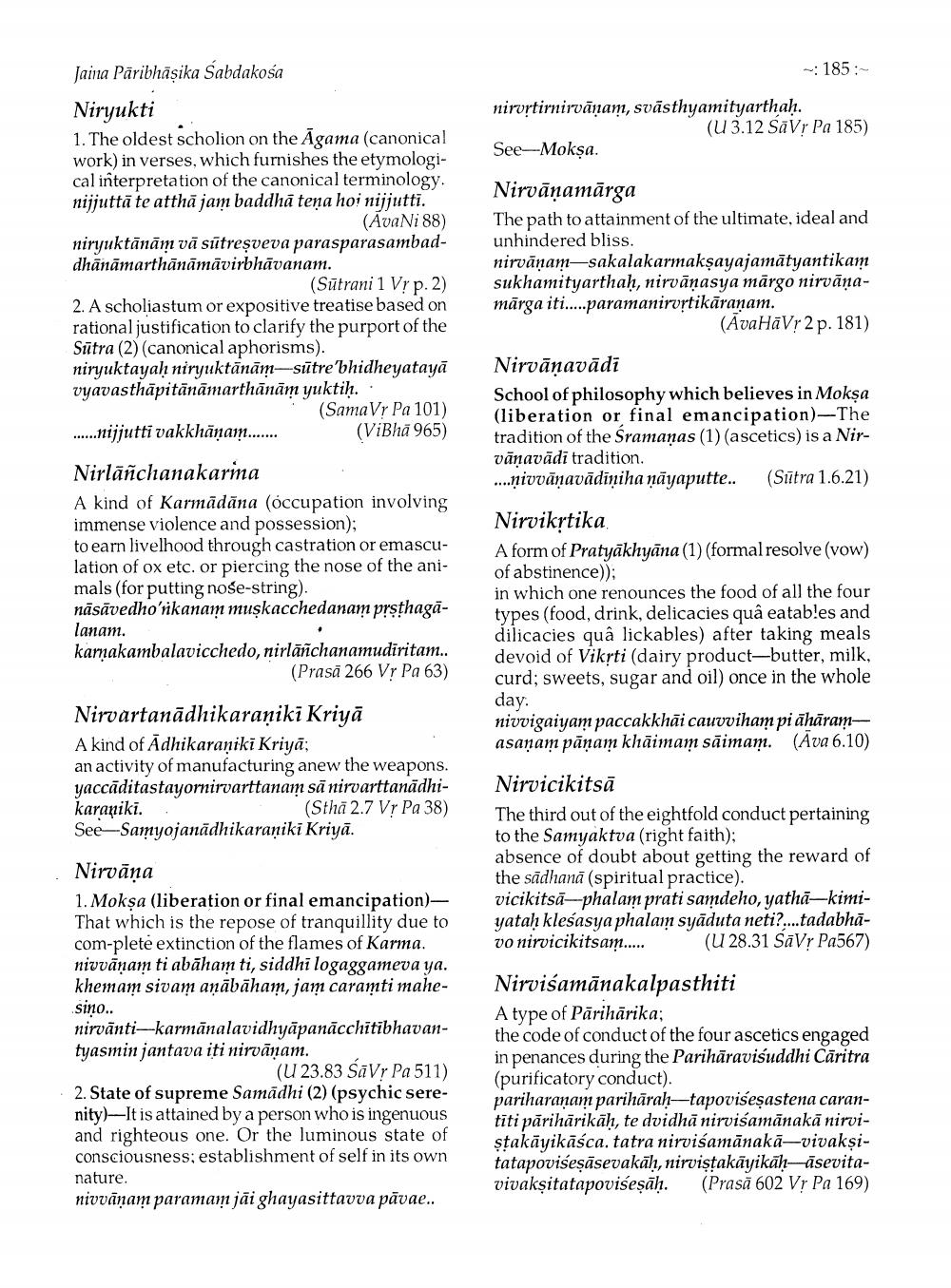________________
Jaina Paribhāṣika Sabdakosa
Niryukti
1. The oldest scholion on the Agama (canonical work) in verses, which fumishes the etymological interpretation of the canonical terminology. nijjuttä te atthä jam baddha tena hoi nijjutti.
(Avani 88) niryuktānām va sutreṣveva parasparasambaddhānāmarthānāmāvirbhāvanam.
(Sūtrani 1 Vr p. 2) 2. A scholiastum or expositive treatise based on rational justification to clarify the purport of the Sutra (2) (canonical aphorisms). niryuktayaḥ niryuktänäm-sütre bhidheyataya
vyavasthäpitänämarthänäm yuktih.
......ijjutti vakkhāṇam.........
(SamaVr Pa 101) (Vibha 965)
Nirlanchanakarina
A kind of Karmādāna (óccupation involving immense violence and possession);
to earn livelhood through castration or emasculation of ox etc. or piercing the nose of the animals (for putting nose-string). nāsāvedho'nikanam muskacchedanam pṛṣṭhagā
lanam.
karnakambalavicchedo, nirlaichanamudiritam.. (Prasa 266 Vr Pa 63)
Nirvartanadhikaraniki Kriya
A kind of Adhikaraṇiki Kriyā,
an activity of manufacturing anew the weapons. yacciditastayornirvarttanam sa nirvarttanadhi(Stha 2.7 Vr Pa 38) See-Samyojanadhikaraṇiki Kriyā.
karaniki.
Nirvana
1. Mokṣa (liberation or final emancipation)That which is the repose of tranquillity due to com-plete extinction of the flames of Karma. nivvāņam ti abāham ti, siddhi logaggameva ya. khemam sivam aṇäbäham, jam caranti mahe
sino..
nirvänti-karmanalavidhyapanacchitibhavantyasmin jantava iti nirvanam.
(U 23.83 SaVr Pa 511) 2. State of supreme Samadhi (2) (psychic serenity)-It is attained by a person who is ingenuous and righteous one. Or the luminous state of consciousness; establishment of self in its own
nature.
nivvāņam paramam jäi ghayasittavva pāvae...
~: 185:~
niroṛtirnirvanam, svasthyamityarthaḥ. (U 3.12 SaVṛ Pa 185)
See-Moksa.
Nirvāṇamārga
The path to attainment of the ultimate, ideal and unhindered bliss.
nirvanam sakalakarmakṣayajamatyantikam sukhamityarthaḥ, nirvaṇasya margo nirvanamarga iti.....paramanirurtikaranam.
(AvaHaVṛ 2p. 181)
Nirvaṇavādi
School of philosophy which believes in Mokşa (liberation or final emancipation)-The tradition of the Sramanas (1) (ascetics) is a Nirvanavadi tradition.
....ṇivvāṇavādīṇiha ṇāyaputte...
(Sutra 1.6.21)
Nirvikṛtika
A form of Pratyakhyāna (1) (formal resolve (vow) of abstinence));
in which one renounces the food of all the four types (food, drink, delicacies quâ eatables and dilicacies quâ lickables) after taking meals devoid of Vikṛti (dairy product-butter, milk, curd; sweets, sugar and oil) once in the whole day.
nivvigaiyam paccakkhai cauvviham pi ähāramasaṇam pāṇam khaimam säimam. (Ava 6.10)
Nirvicikitsa
The third out of the eightfold conduct pertaining to the Samyaktva (right faith);
absence of doubt about getting the reward of the sadhand (spiritual practice). vicikitsa-phalam prati samdeho, yatha-kimiyataḥ klesasya phalam sydduta neti?....tadabhāvo nirvicikitsam..... (U 28.31 Savy Pa567)
Nirvisamänakalpasthiti
A type of Pärihärika;
the code of conduct of the four ascetics engaged in penances during the Pariharaviśuddhi Câritra (purificatory conduct).
pariharanam parihāraḥ-tapoviseṣastena carantiti pärihärikäḥ, te dvidha nirviśamānakā nirviṣṭakayikäśca. tatra nirviśamanakā-vivakṣitatapoviseṣasevakāh, nirviṣṭakāyikāḥāsevitavivakṣitatapoviseṣāḥ. (Prasă 602 Vr Pa 169)




